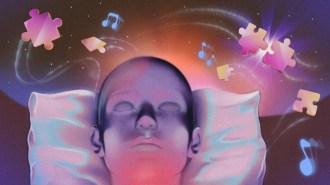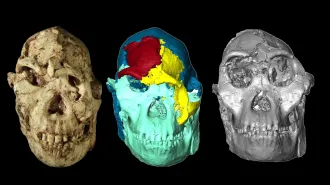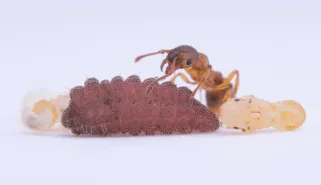Microbes at home in your gut may also be influencing your brain
- More than 2 years ago
When your gut grumbles or growls, it’s speaking to your brain. And it’s a perfectly reasonable thing to do. Evolution favors guts that can tell a brain what they want.
So it’s not surprising that the brain and the gut should have a reliable communications connection. But suppose the gut’s messaging system was hacked by foreign invaders sending a different sort of message, messing with your mind. Guess what? It is. Unless you’re a special sort of experimental mouse, your gut already hosts something close to 100 trillion invaders. They’re members of perhaps a thousand different species from half a dozen or more phyla of microbes.
Actually, it would be more proper to call most of those invaders colonists. In the first few days after birth, a baby’s gut becomes home to diverse families of microbes that normally hang around for a lifetime. These colonist microbes outnumber your own cells. But they pose no threat of declaring themselves a ruling majority and taking over your body. They are allies, helping you digest your food and assisting in protecting you from disease. And they send important signals to your brain.
The precise mix of these colonist microbes is not the same in all individuals. It depends on your age, your genes, what you eat and where you live, among other things. And any one person’s mix can change over time.
“We are only beginning to understand how the diversity and distribution of these prominent phyla contribute to health and disease,” write Jane Foster and Karen-Anne McVey Neufeld in the May Trends in Neurosciences.
Your gut’s colonial microbes aid in the development of the immune system, which battles malicious bugs that aren’t normally part of your gut’s microbiota — its microbial repertoire. “Germ-free” mice raised without colonist microbes have a weaker immune system and show exaggerated responses to stress. Studies have also shown that gut microbes influence signaling in the HPA axis (for hypothalamus, pituitary gland and adrenal glands, the key players in the body’s response to stress).
Early in development, gut microbes affect the wiring of nerves in the stress system, influencing how the body reacts to stress for the rest of its life. That suggests that the microbiota’s impact extends to some aspects of mental health, a function only recently appreciated.
“We suggest that gut microbiota are an important player in how the body influences the brain … and influence risk of disease, including anxiety and mood disorders,” write Foster and Neufeld, of McMaster University in Hamilton, Canada.
Depression, for instance, might be related to snafus in stress-axis signaling that microbes can influence. But the bugs may also affect the brain more directly, adjusting the sensitivity of nerve cells in the gut that send signals to the brain to influence behavior. Gut bacteria also appear to alter the chemical activity of nervous system messenger molecules such as serotonin, an important player in mood disorders including depression.
Almost all the evidence establishing this new understanding of the gut’s germs comes from mouse studies. So the lessons for using this knowledge to help out humans are limited. Nevertheless, the mouse research suggests some possibly promising avenues to explore.
For one thing, treatment with “probiotics” — friendly microbes consumed not as medicine but as a nutritional supplement — may prove helpful in fighting anxiety and depression. Probiotics reduce anxiety and depressive behavior in mice, and similar effects have been seen in a few human studies. Those studies, though, merely showed lower scores on stress and anxiety questionnaires in healthy people after they took probiotics. It will take tests in actual psychiatric patients to see whether probiotics will really be useful treatments for people with serious mood disorders.
In any event, it’s not very likely that manipulating the mix of microbes in the gut will become a cure-all for mental illness. But it’s also not a good strategy to treat depression and other mood disorders by focusing only on the brain while neglecting the gut microbiota. That would be like blaming global warming on power plants while ignoring cars and cattle (not to mention the cattle’s own microbiota). Complex systems pose problems that can’t be solved by pretending that the issue is simpler than it is.
And the gut microbiota’s impact on the body and brain may be even more complex than research to date has shown. Gut microbiota may affect learning and memory. Studies of gut microbiota might even offer new insights into such baffling medical problems as autism, obesity and, perhaps, personality disorders.
So far, the evidence is not conclusive on those points. But some scientists have a gut feeling about it.
Follow Tom Siegfried on Twitter at @tom_siegfried.






